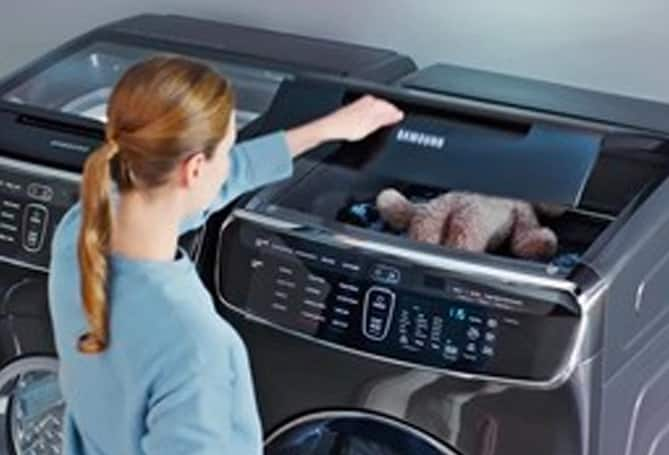What Should I Look for When Buying a Washing Machine?

carousel
Before washing machines, doing laundry used to take an entire day of serious physical labor that involved using harsh soap, scalding water and rudimentary tools. Thanks to technology, the entire process has been simplified to throwing some clothes in a machine for an automated wash cycle then tossing them in a dryer.
With all the non-stop innovation in the field of laundry, there is an abundance of choices. While that may be a good thing, it also means that it might be overwhelming to choose which model of washing machine you should buy. Front-load or top-load washer? High-efficiency or traditional? Combo washer/dryer or stackable? Keep reading to learn what questions you should ask to help you find the best washing machine for your needs.
What washer capacity do I want?
The first thing to consider when buying a washing machine is capacity. A washer's capacity refers to the space inside the barrel which determines the size of the load that the machine can wash in a single cycle. Washing machine capacity generally breaks into three categories: compact washers (a capacity under 4 cubic feet), standard washers (4 to 4.5 cu ft), and large capacity machines (greater than 4.5 cu ft).
Standard might be the right size for someone doing a full basket of laundry once or twice a week. But if you have a large family or feel like you’re constantly washing sports jerseys or soiled baby clothes, you’ll likely want to go with a larger capacity. However, if you have limited space, you might have to stick with a standard or even a compact option. The upside to compact models is that going smaller will generally save you money, as size corresponds to a significant degree with price. And compact can be more than sufficient if you live alone or as part of a couple.
Should I choose a top- or front-loading washer?
Whether you choose a top-load or front-loading washing machine is a decision based on efficiency vs. ease of use. Front-loading washers use less water (25% less on average) and are also more energy efficient than top-loading versions.See Disclosure 1 Another benefit of front-load machines is that they use less detergent because the clothing tumbles through the water rather than being fully submerged with an agitator. So, if you want to save on your water bill or if you live in a region that experiences water shortages, like the southwestern U.S., you can make a difference by choosing a front-loading machine.
Meanwhile, the advantages of top-loading washers is that they are slightly more reliable and easier to repair. They are also easier to clean because they don’t have a gasket around the door that collects buildup. Also, with a top-load model you can also add laundry partway through the cycle, which cannot be done with a front-loading machine.
You can find top-loading machines designed with efficiency in mind even if they don’t conserve water quite as well as front loaders. Efficient top loaders will sense the size of each laundry load and only fill the water to the appropriate level. Whether you choose a front loader or a top loader, look for an ENERGY STAR certification washer or one with a high-efficiency (HE) rating. These options will help you live more sustainably, reduce energy use and save money in the long run.
What is a washer/dryer combo?
Believe it or not, you can combine a washer and dryer into a single machine. Combination washer/dryers offer a wide range of settings to fit your needs all in one appliance. Since you can move straight from washing into drying without having to change out the laundry inside, combo washer/dryers are highly convenient.
However, this combo appliance should not be confused with a stacked washer and dryer, which allows you to have two loads going at once. Additionally, combo washers and dryers are all-electric, which means you cannot use gas energy for drying. Another drawback to drying clothes in these machines is that it takes a little longer because unlike standard dryers, they do not have air venting. But they are the perfect solution for households with limited space.
What is a pedestal washer?
Important washing machine considerations
Before buying your washer, always measure the space you have available so that you choose an appliance that will easily fit. Also, be sure to assess the room layout to determine the most convenient orientation for your door if you have a front loader. If there isn’t enough space for a door to open in either direction, then you’ll know that a top-loader washer is your best bet.
For front-loading washers, it’s generally useful to have washer and dryer doors that open away from each other so that there is nothing in the way of moving clothes from one machine to the other. The final step in preparation is to ensure that you have all the washer and dryer accessories you need before you schedule your appliance delivery and installation service.